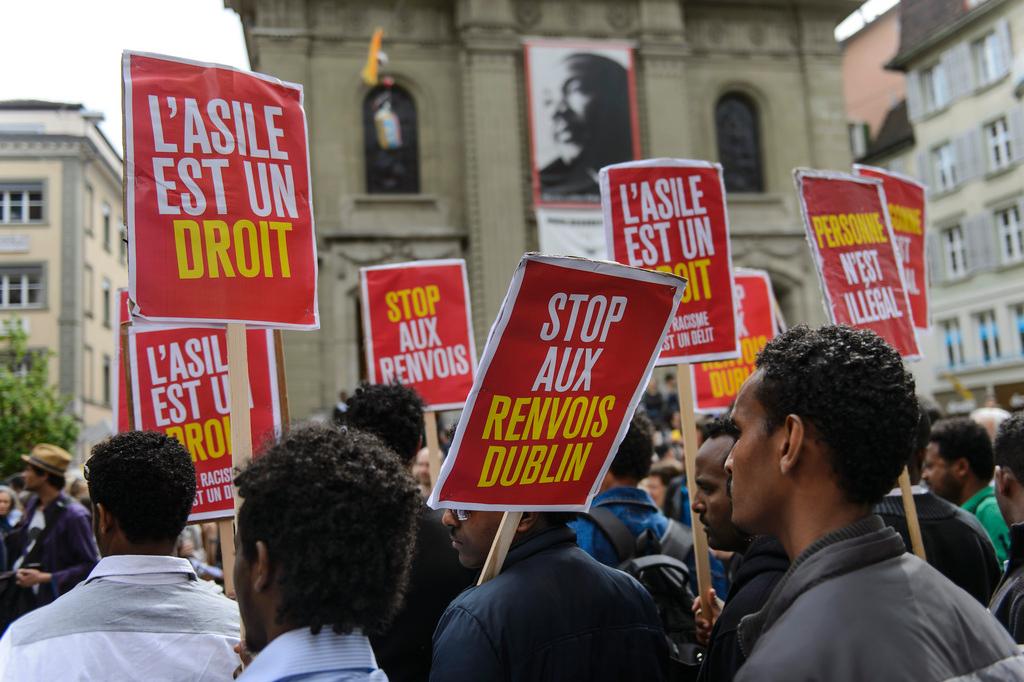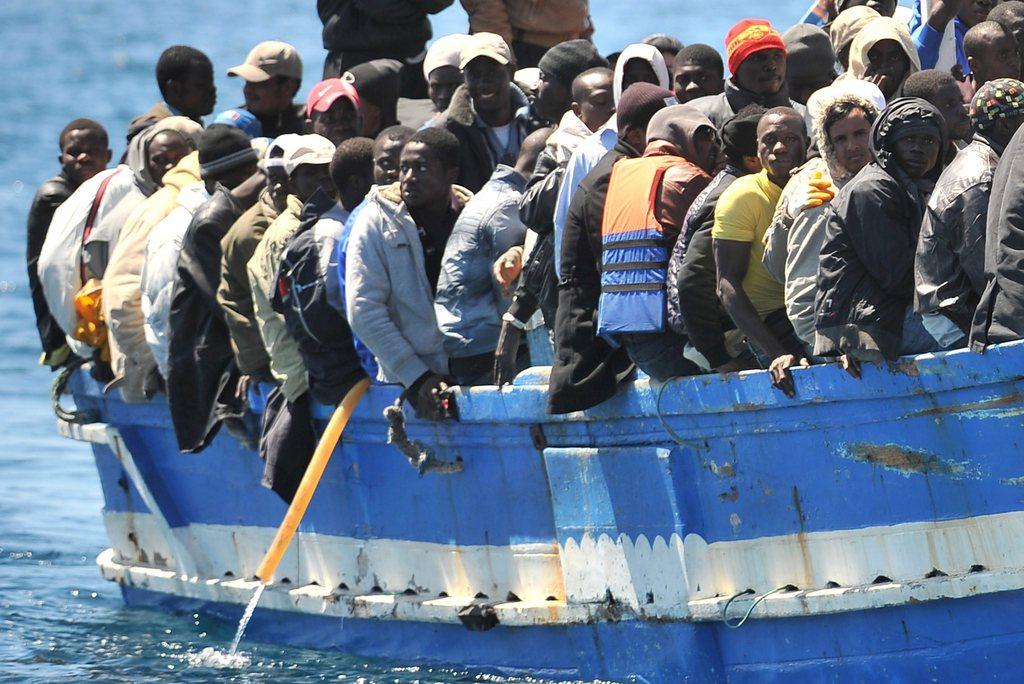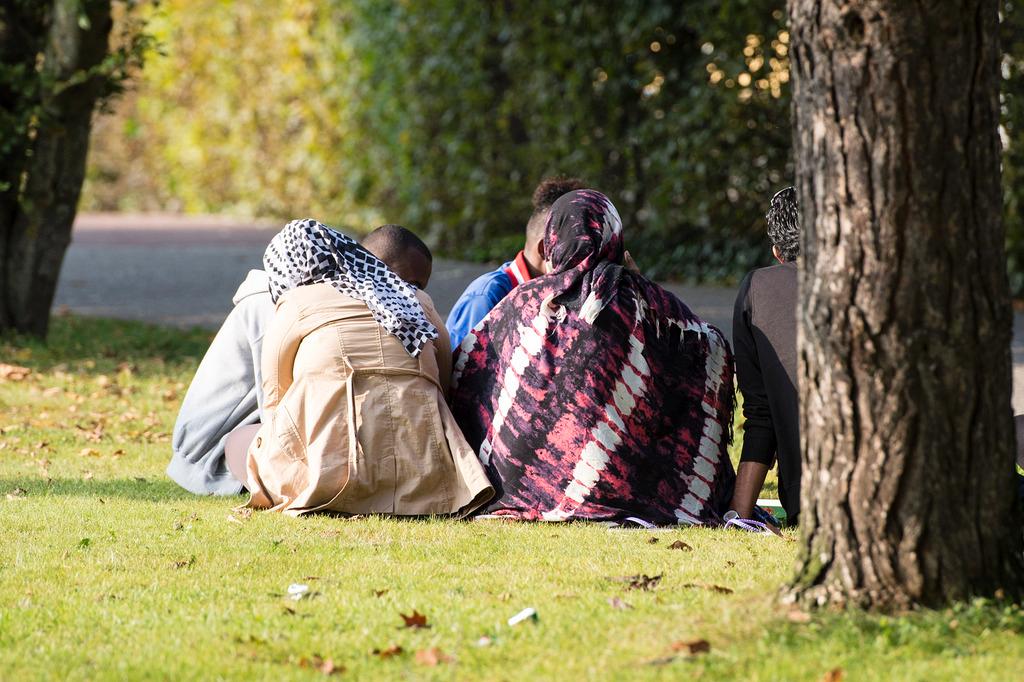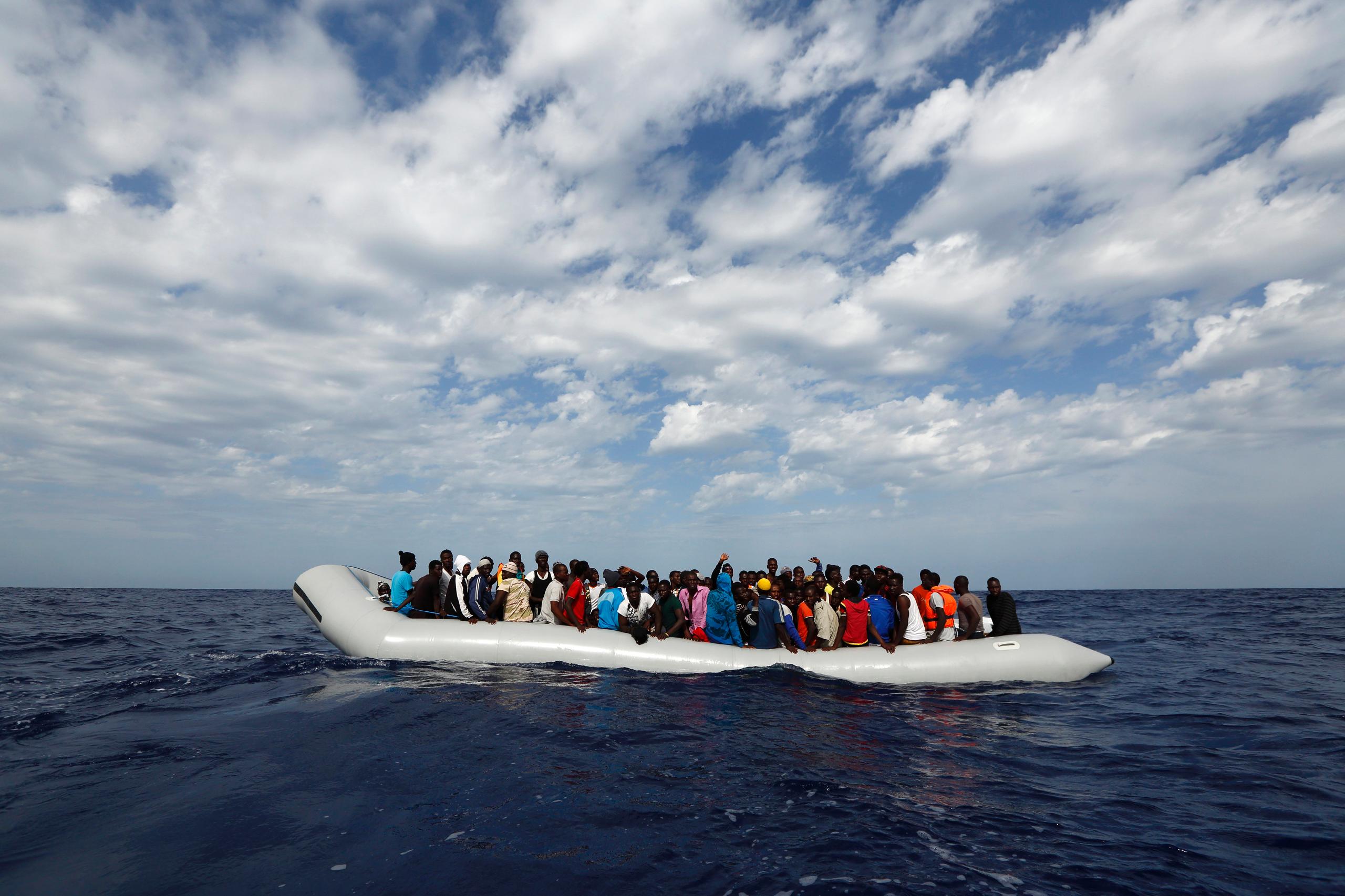Lausanne church refugees put spotlight on Dublin

The case of five asylum seekers occupying a Lausanne church while awaiting deportation has put the spotlight on the effectiveness of Europe’s migrant system.
“Boats are sinking. Switzerland is turning people away.” A chant strikes up outside Lausanne’s St Laurent Church, as around 1,000 demonstrators waving flags and “Stop Dublin returns” banners prepare for a march through the city centre.
The protestors’ meeting point on May 9 was no coincidence. The church remains at the centre of a controversy after providing shelter since the beginning of March to five rejected asylum seekers – four Eritrean men and one Ethiopian woman – who are supposed to leave Switzerland.
Their asylum applications were turned down by the Swiss authorities, which state that under the current system they should be sent back to the first countries where they set foot in Europe – in these cases, mainly to Italy, but also to Sweden and the Netherlands. Activists helped them move into the church from asylum accommodation in the hope they can avoid expulsion.
Switzerland is not a member of the European Union but is associated with the single border Schengen and Dublin accordsExternal link. Under the so-called Dublin regulation, the first European country where an asylum seeker arrives has the responsibility of fingerprinting the person and hearing his application. Asylum seekers who travel to another country and reapply for asylum are sent back to the country where they first applied.
The activists helping the church occupants, led by the group Collectif RExternal link, say they are legitimate refugees who should be dealt with in Switzerland and have their rejected cases reconsidered instead of being sent elsewhere.
“The Dublin system doesn’t work. It’s completely unfair, like a lottery. We move people around Europe like goods. There is a principle called right to asylum and the people in this church should have that right,” said Collectif R spokesman Marc Gigase.
They criticise Switzerland’s ‘cynical attitude’ in returning asylum seekers to countries like Italy, Greece and Hungary, where they say they risk destitution.
“If I leave here, I won’t know anyone. I won’t know where to sleep or live. The situation in Italy is unacceptable; it’s inhumane,” said Amar, one of the church occupants.
The campaigners are urging Switzerland – a ‘good Dublin student’ in their eyes – to consider a wider moratorium on the returns. According to the State Secretariat for Migration SEMExternal link, Switzerland has expelled 20,000 asylum seekers since it joined the Schengen zone of countries in 2008. A total of 2,638 people were transferred to another Dublin state in 2014 – half to Italy.
Since March their action on behalf of the five occupants has gained certain traction.
In March the Vaud parliament voted against strictly applying the Dublin regulations and expelling the church occupants. On May 13, it also urged the local government to reconsider their asylum applications and to request the federal government to ‘activate a discretionary sovereignty clause when personal motives, especially medical, oppose a Dublin expulsion’.
Views on the issue remain entrenched, however.
“It’s not up to Switzerland to deal with Italy’s failures as it can’t manage the number of asylum requests… It’s not by maintaining the myth of the Swiss Eldorado that we will resolve this problem,” said the conservative right Swiss People’s Party parliamentarian Michael Buffat.
Philippe Leuba, the Vaud minister in charge of asylum and a member of the centre-right Radical Party, accuses the activists of being naive. He says not applying the Dublin regulations would be both undemocratic and potentially illegal.
“It is false to claim that the boat is full in Italy and not in Switzerland,” he told parliamentarians. Figures released by the European Union’s statistical office on May 12External link showed that proportionally Switzerland admits more asylum seekers into the country on a provisional basis than most other European nations. The majority are only given a temporary right to stay and do not qualify for refugee status.
Struggling to cope
Migrant numbers into Europe have surged. In 2014 over 170,000 refugees and migrants arrived in Italy by sea, including more than 10,000 unaccompanied children, the vast majority having departed from Libya. So far this year 51,000 have entered Europe by sea, with 30,500 coming via Italy. As Italy struggles to cope with the waves of new arrivals, reception and protection conditions there have raised concerns.
In November 2014 a ruling by the European Court of Human Rights urged Switzerland not to send an Afghan family back to Italy under the Dublin agreement without having first obtained individual guarantees from the Italian authorities that applicants would be properly looked after and the family kept together. The family finally left Switzerland for Italy in April this year after they received the necessary assurances.
But in general conditions in Italy, as well as in Greece and Hungary, remain a worry.
“The authorities struggled to ensure adequate reception conditions for the tens of thousands of refugees and migrants who disembarked in Sicily and other southern ports… Refugees and asylum-seekers, including children, remained at risk of destitution,” Amnesty International stated in its 2014-2015 annual report.External link
“Italy has created 70,000 places with EU support but it’s not sufficient,” said Denise Graf, a lawyer and asylum specialist with the Swiss section of Amnesty.
Uncertain future
In a bid to help Italy and other southern EU states clamouring for help to deal with the thousands of migrants reaching Europe by boat, the EU’s executive proposed on May 13 taking in 20,000 refugees over two years and distributing them according to a quota system. Justice Minister Simonetta Sommaruga told Brussels Switzerland was willing to contribute to the plan for shared solidarity, but the details still had to be examined.
Back in Lausanne, the Vaud government says it is not suspending Dublin returns to Italy but has agreed to check on asylum seeker reception conditions in Italy before they take any decision on the church occupants. In the meantime, St Laurent’s priest says they can stay where they are for now.
“The role of the church is to welcome the poor and downtrodden members of society and to be more generous than the norm in society,” Jean Chollet told swissinfo.ch.
The protests and offers of help have given the asylum seekers a sense of hope. However, their situation remains in limbo.
“I feel that my life is changing thanks to these people who have been helping us,” said Abraham. “I don’t know what is going to happen tomorrow. But at least today everything’s ok.”
Migrant numbers
According to the UN’s refugee agency (UNHCR), 219,000 refugees and migrants crossed the Mediterranean last year, and at least 3,500 died trying. More than 1,800 are believed to have died already this year.
So far this year some 51,000 have entered Europe by sea, with 30,500 coming via Italy, fleeing war and poverty in Asia, Africa and the Middle East.
Currently, five of the 28 member states – Italy, Greece, Malta, Germany and Sweden – are handling almost 70% of the migrants coming in.
A quarter of the applicants are of Afghan, Eritrean or Syrian origin, and a similar proportion are under 18 years of age.
Generous Swiss?
According to figuresExternal link released by the European Union’s statistical office on May 12, 71% of asylum seekers were admitted provisionally into the country in 2014, compared to an EU average of 45%.
Only Bulgaria (94%) Sweden (77%), Cyprus (76%), and Malta (73%) have a higher share of positive decisions. But apart from Sweden, these countries receive far fewer asylum seekers than Switzerland.
Of the 15,575 cases that received a positive decision from the Swiss authorities, only around 40% were actually granted refugee status.
Around 43% of cases were allowed to remain on humanitarian grounds due to ill health or because they were unaccompanied minors. The remaining 17% were offered subsidiary protection, as they faced a risk of harm if returned to their countries of origin.
Switzerland is also particularly harsh when it comes to appeals against asylum rejection decisions. Only 7% of the appeals resulted in a positive decision compared to an EU average of 18%.

In compliance with the JTI standards
More: SWI swissinfo.ch certified by the Journalism Trust Initiative





You can find an overview of ongoing debates with our journalists here. Please join us!
If you want to start a conversation about a topic raised in this article or want to report factual errors, email us at english@swissinfo.ch.